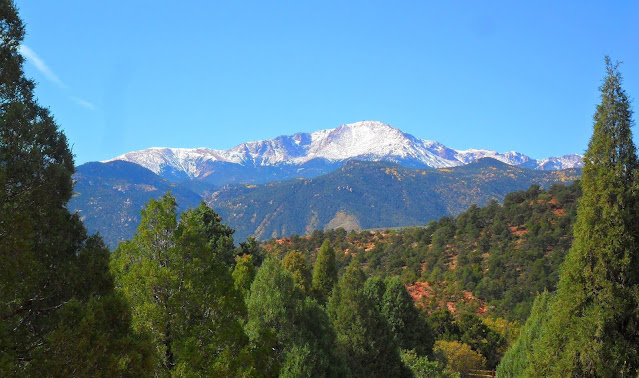The author of the hymn "America the Beautiful," Katharine Lee Bates, was born in Falmouth, Massachusetts in 1859 and grew up near the rolling sea. Bates, who eventually became a full professor of English literature at Wellesley College, made a lecture trip to Colorado in 1893 and there she wrote the words to "America the Beautiful."
As she told it, "We strangers celebrated the close of the session by a merry expedition to the top of Pike's Peak, making the ascent by the only method then available for people not vigorous enough to achieve the climb on foot nor adventurous enough for burro-riding. Prairie wagons, their tail-boards emblazoned with the traditional slogan, "Pike's Peak or Bust," were pulled by horses up to the half-way house, where the horses were relieved by mules. We were hoping for half and hour on the summit, but two of our party became so faint in the rarified air that we were bundled into the wagons again and started on our downward plunge so speedily that our sojourn on the peak remains in memory hardly more than one ecstatic gaze. It was then and there, as I was looking out over the sea-like expanse of fertile country spreading away so far under those ample skies, that the opening lines of the hymn floated into my mind."
On July 4, 1895, Bates' poem first appeared in The Congregationalist, a weekly newspaper. Bates revised her lyrics in 1904, a version published that year in The Boston Evening Transcript, and made some final additions to the poem in 1913.
For several years "America the Beautiful" was sung to almost any popular air or folk tune with which the lyrics fit: "Auld Lang Syne" was one of the most common. Today it is sung to a melody written in 1882 by Samuel Augustus Ward, a Newark, New Jersey, church organist and choirmaster. Ward originally composed the melody (also titled "Materna") to accompany the words of the sixteenth century hymn "O Mother Dear, Jerusalem." When the National Federation of Music Clubs sponsored a 1926 contest to elicit new music for Bates' poem but failed to find a winner, Ward's music prevailed.
"America the Beautiful" has been called "an expression of patriotism at its finest." It conveys an attitude of appreciation and gratitude for the nation's extraordinary physical beauty and abundance, without triumphalism. It has also been incorporated into a number of films including The Sandlot and The Pentagon Wars. Its lyricist, Katharine Lee Bates, died March 28, 1929, and is buried in Falmouth, Massachusetts, and its composer, Samuel A. Ward, died on September 28, 1903, in Newark, New Jersey.
Source: Library of Congress
Photo: Pikes Peak, Colorado
America the Beautiful
O beautiful for spacious skies,
For amber waves of grain,
For purple mountain majesties
Above the fruited plain!
America! America!
God shed his grace on thee
And crown thy good with brotherhood
From sea to shining sea!
O beautiful for pilgrim feet
Whose stern impassioned stress
A thoroughfare of freedom beat
Across the wilderness!
America! America!
God mend thine every flaw,
Confirm thy soul in self-control,
Thy liberty in law!
O beautiful for heroes proved
In liberating strife.
Who more than self their country loved
And mercy more than life!
America! America!
May God thy gold refine
Till all success be nobleness
And every gain divine!
O beautiful for patriot dream
That sees beyond the years
Thine alabaster cities gleam
Undimmed by human tears!
America! America!
God shed his grace on thee
And crown thy good with brotherhood
From sea to shining sea!


No comments:
Post a Comment